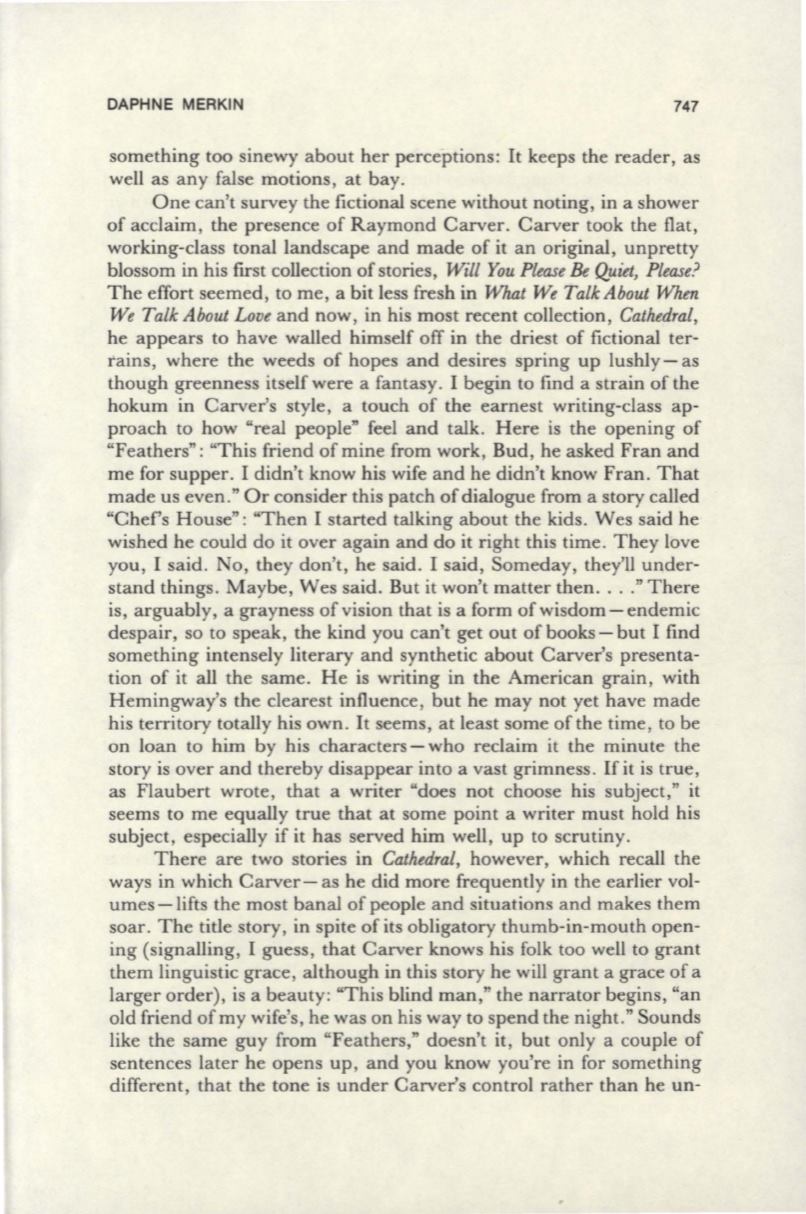
DAPHNE MERKIN
747
something too sinewy about her perceptions: It keeps the reader, as
well as any false motions, at bay.
One can't survey the fictional scene without noting, in a shower
of acclaim, the presence of Raymond Carver. Carver took the flat,
working-class tonal landscape and made of it an original, unpretty
blossom in his first collection of stories,
Will You Please Be Quiet, Please?
The effort seemed, to me, a bit less fresh in
What We Talk About When
We Talk About Love
and now, in his most recent collection,
Cathedral,
he appears to have walled himself off in the driest of fictional ter–
rains, where the weeds of hopes and desires spring up lushly- as
though greenness itself were a fantasy. I begin to find a strain of the
hokum in Carver's style, a touch of the earnest writing-class ap–
proach to how "real people" feel and talk. Here is the opening of
"Feathers": "This friend of mine from work, Bud, he asked Fran and
me for supper. I didn't know his wife and he didn't know Fran. That
made us even." Or consider this patch of dialogue from a story called
"Chef's House": "Then I started talking about the kids. Wes said he
wished he could do it over again and do it right this time. They love
you, I said. No, they don't, he said. I said, Someday, they'll under–
stand things. Maybe, Wes said. But it won't matter then ...."There
is, arguably, a grayness of vision that is a form of wisdom-endemic
despair, so to speak, the kind you can't get out ofbooks-but I find
something intensely literary and synthetic about Carver's presenta–
tion of it all the same. He is writing in the American grain, with
Hemingway's the clearest influence, but he may not yet have made
his territory totally his own.
It
seems, at least some of the time, to be
on loan to him by his characters- who reclaim it the minute the
story is over and thereby disappear into a vast grimness.
If
it is true,
as Flaubert wrote, that a writer "does not choose his subject," it
seems to me equally true that at some point a writer must hold his
subject, especially if it has served him well, up to scrutiny.
There are two stories in
Cathedral,
however, which recall the
ways in which Carver- as he did more frequently in the earlier vol–
umes -lifts the most banal of people and situations and makes them
soar. The title story, in spite of its obligatory thumb-in-mouth open–
ing (signalling, I guess, that Carver knows his folk too well to grant
them linguistic grace, although in this story he will grant a grace of a
larger order), is a beauty: "This blind man," the narrator begins, "an
old friend of my wife's, he was on his way to spend the night." Sounds
like the same guy from "Feathers," doesn't it, but only a couple of
sentences later he opens up, and you know you're in for something
different, that the tone is under Carver's control rather than he un-


